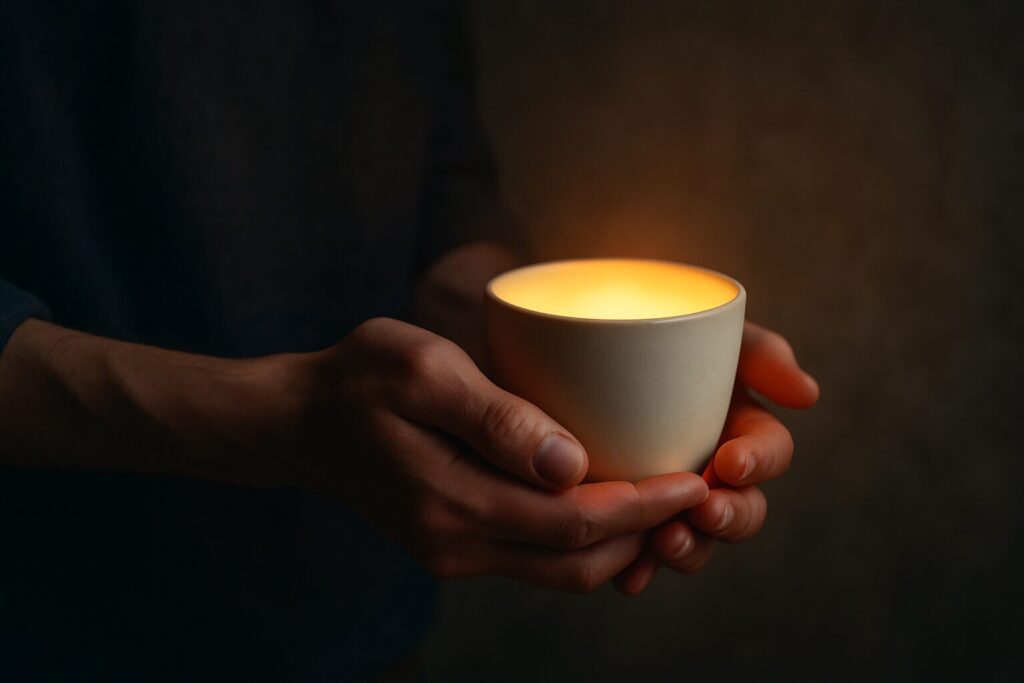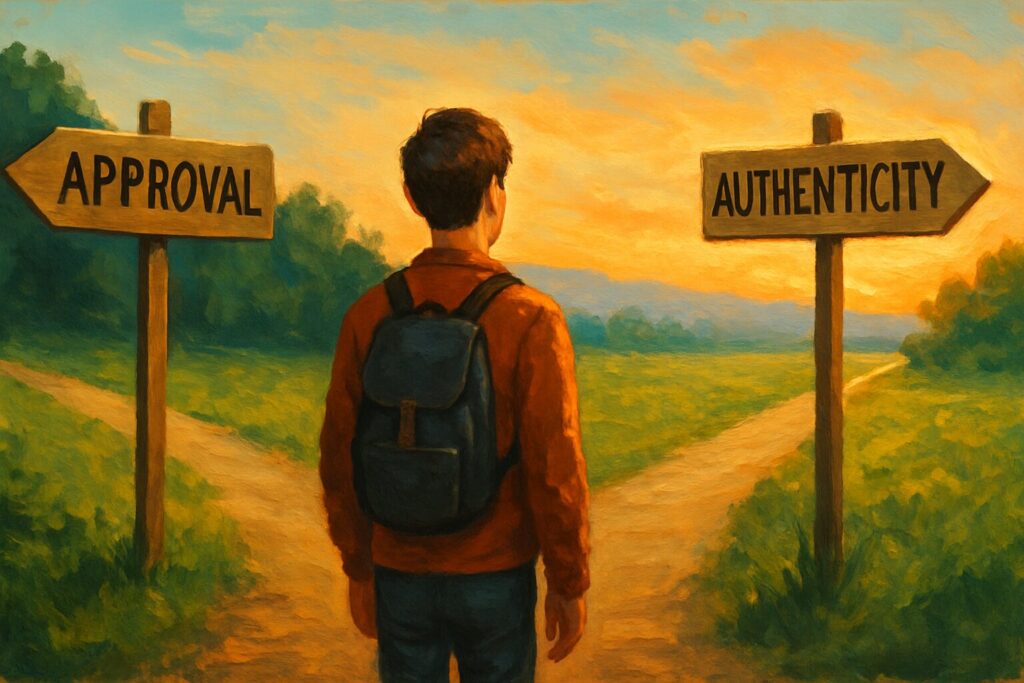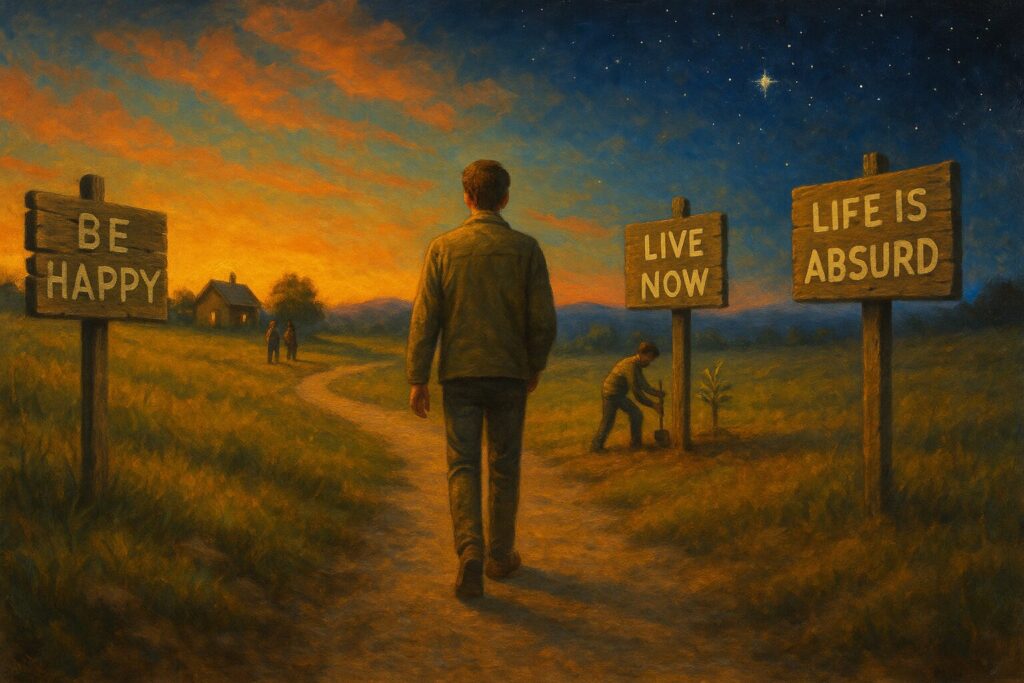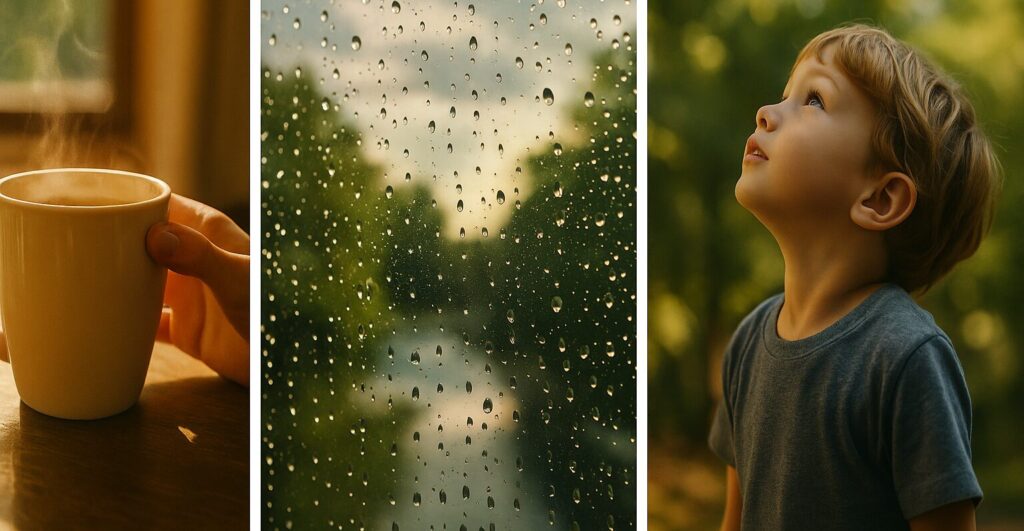Philosophy
When people look back at the end of their lives, the most common refrain is not, “I wish I had failed less.” It is, “I wish I had lived truer to myself.” Regret aches because it cannot be undone. We can recover from failure, but we cannot recover the chances we never took. That is why regret often stings deeper than loss.
The Cup Metaphor
Life places a cup in our hands. We did not ask for it, and we cannot hold it forever. But while it’s ours, we face two tasks: to fill it and to savor it.
The Courage to Put Your Real Self on the Line
Most of us learn early how to wear masks. We present the version of ourselves we think will be accepted: the dutiful student, the competent worker, the agreeable friend. Masks keep us safe. They win us approval. But masks also cost us. When we hide our real passions, fears, and longings, we begin to feel hollow. Life becomes performance, not presence. We win applause but lose authenticity.
The Joy of Creation
Most creatures survive by instinct. They hunt, nest, migrate, reproduce. Humans do these things too — but then we do something extra. We make.
Aesthetic Experience Triad
There are moments when life feels electric. A song swells, a sunset flares, a child laughs — and suddenly you feel it: the tingle of meaning. It’s not just pleasure. It’s not even quite happiness. It’s the sense that life, in this moment, is precious.
Remembering the Gift of Being Alive
We are surrounded by so much routine—commutes, bills, inboxes—that life itself begins to feel ordinary. But the truth is the opposite: life is a luxury. A miracle. A once-in-eternity gift.
The Borrowed Eyes Experiment
Familiarity is a thief. It steals the shine from our days. You’ve looked at the sky thousands of times, so now it’s just the sky. You’ve heard your child’s laughter, or your partner’s voice, or the hum of the refrigerator so often that you don’t even register it. The miracle dulls under repetition.
Honesty Over Airbrushing
Life is not airbrushed. It is jagged and uneven, full of moments that hurt so much they shatter our composure. To deny this reality isn’t strength. It’s alienation from our own humanity.
The Small Gifts of Being Human
When we think about what makes human life extraordinary, we often jump to the big things: love, art, achievement, purpose. These deserve their place, but sometimes we overlook the smaller treasures — the ones hiding in plain sight, woven into the fabric of daily life.
A Selfhood Triad
Don’t wait for a perfect revelation of identity. Don’t fear if your voice feels shaky. Selfhood is the road, not the finish line. Because in the end, the greatest adventure is not in discovering some hidden self. It’s in becoming the one only you can be.
Living by Our Own Values
So much of life is lived chasing what others expect. Parents, peers, bosses, culture — they all hand us scripts: earn this title, buy that house, look successful. We follow, often without questioning. And sometimes we achieve those ambitions, only to discover an unsettling truth: we feel hollow. Because borrowed ambitions can’t fill us. They belong to someone else.
Life as Adventure vs. Distraction
There are two ways most of us live. One is as adventure: life as an unfolding story, full of risk, discovery, and meaning. The other is as distraction: life as a blur of routines, entertainment, and avoidance.
Personal Passion as Soul’s Ambition
Ambition isn’t the problem. Blind ambition is. When we chase success without asking why, we end up empty. But when ambition grows from personal passion, it becomes something entirely different: a compass for the soul.
Time as a Treasure
We usually treat time as an enemy. We complain that there’s never enough, or we dread how quickly it slips away. But time itself is one of life’s greatest gifts. Other creatures live mostly in the immediacy of instinct. Humans live in three dimensions: we remember the past, we savor the present, and we anticipate the future. Each dimension enriches us, making life more than a blur of moments.
Aesthetic Experience as a Reason for Living
We’ve all had days when life technically continued but felt empty, thin, almost pointless. Food was on the table, but appetite was gone. Time passed, but meaning was missing. In those seasons, we need more than existence. We need a reason to stay. For human beings, that reason often comes through aesthetic experience — the moments when life feels not only bearable but luminous, charged with significance.
Breaking Cliches
Clichés offer half-truths. Life Savor offers wholeness. We need happiness and fulfillment, savoring and striving, acceptance of death and celebration of life. By breaking the slogans open, we recover a richer philosophy of living—one that does justice to the gift of life itself.
The Back-Pocket Perspective
Life is not designed to be easy. It is turbulent, uneven, unpredictable. Some days feel like victory laps, others like collapse. To demand that we “always savor life” or “always feel grateful” is to set ourselves up for disillusionment. The truth is, no one can carry a sunlit perspective 24/7. And that’s okay. Because perspective doesn’t lose its value just because it isn’t always active. Sometimes, it’s enough to know that a helpful way of seeing the world is tucked in your back pocket, ready when you need it.
The Joy of Standing Alone
We’re wired to crave belonging. For most of human history, standing apart from the tribe meant danger, even death. So it’s no surprise that in the modern world, the thought of standing alone can make our hearts pound. Conformity whispers safety; independence feels risky. And yet, paradoxically, some of life’s richest joys come not from blending in, but from daring to stand apart. Independence isn’t only about hard duty or lonely burden. Sometimes, it feels like freedom in its purest form: exhilarating, life-affirming, joyful.
Life vs. Entropy
Left alone, everything falls apart. Wood rots. Muscles weaken. Friendships fade. Buildings crumble. Lives unravel. The universe tends toward entropy — disorder, disintegration, decay. And yet, here we are: building, loving, creating, striving. To live at all is to resist the pull of collapse. Every act of growth is a rebellion against the drag of entropy.
Mortality as a Wakeup Call
Death is the truth we avoid. We distract ourselves, euphemize, hide it behind hospital curtains and polite silence. But avoidance doesn’t erase reality. The clock is ticking for each of us. This sounds grim, but it doesn’t have to be. Mortality is not only the end of life. It is the wakeup call that gives life urgency.
The False Compass of Blind Ambition
Blind ambition is a false compass. It promises meaning but delivers emptiness. It drives us to run faster without asking whether the finish line matters. But ambition aligned with purpose becomes energy for fulfillment. It becomes the spark that turns potential into reality.
Our Precious Aesthetic Experience of Life
Food keeps us alive. Shelter protects us. Medicine repairs us. But what makes life feel worth living is not only survival — it’s those moments when meaning breaks through and we are moved.
Celebrate Your Existence
Life Savor is not a slogan. It’s a perspective—a lens through which existence looks less like a burden and more like a miracle. At its heart, it’s about gratitude: not just for achievements or milestones, but for the baseline fact of being alive.
Aesthetic Awareness Triad
You don’t need a cathedral to experience reverence. A cup of tea will do. You don’t need a symphony to hear hymns of praise. The sound of your own breath is enough. The question is simply: will you notice?
The Courage of Sentiment
In our culture, sentiment often gets dismissed. We praise toughness, stoicism, control. We admire the person who “never lets emotions get in the way,” the leader who never cries, the friend who always keeps their composure. Vulnerability is framed as fragility. Sentiment is mocked as softness. But here’s the truth: sentiment is courage. It is not weakness to feel deeply. It is strength — because it takes far more bravery to care than to wall yourself off.
Independence and Responsibility
Some people hear “independence” and imagine shirking accountability. They picture someone walking away from commitments, refusing ties, living “spontaneously.” But that’s not independence as much as it’s irresponsibility — the refusal to acknowledge the consequences of one’s choices. Independence is not the escape from chosen responsibility. It is the embrace of what we choose.
The Gift of Solitude
Modern life is allergic to silence. We fill every pause with screens, every walk with earbuds, every quiet moment with chatter. Alone time can feel threatening, as if stillness means emptiness. But solitude is not loneliness. Loneliness is the ache of absence; solitude is the gift of presence — presence with ourselves. When embraced, it becomes a fertile space for reflection, creativity, and restoration.
The Leap Into Potential
Potential feels intoxicating. It whispers: You could be great. You could write the book, launch the business, find the love, paint the canvas. Potential flatters us, because it suggests greatness without risk. But potential is not enough. A life can be heavy with possibility yet empty in reality. The tragedy is not wasted effort but wasted potential that never turned into anything lived.
Appreciating Fully
To live fully is not only to fill our cup. It is also to savor what’s already there. Without appreciation, even a rich life can feel empty. Without savoring, we gulp without tasting. Appreciation turns existence into experience. It transforms the ordinary into the extraordinary. It reminds us that the point of life is not just to accumulate, but to delight.
Fulfillment, Not Happiness, as Life’s True North
“Happiness” is one of those words everyone nods at but no one defines the same way. Some mean pleasure. Some mean comfort. Some mean the absence of pain. Others mean success or contentment. The trouble is, happiness is fickle. It shifts with circumstances, moods, even the weather. If we make it our compass, we end up chasing a moving target.
Fulfillment, Not Happiness, as Life’s True North Read More »
The Preciousness of Our Life
Some mornings, I catch myself staring at the sky. It’s not a spectacular sky—no rainbow, no comet, no painter’s sunset. Just a soft blue streaked with clouds, the same kind of sky I’ve seen thousands of times. And yet I’ll pause and think: this is incredible. I’m here, breathing, awake to it.
Life as Humanity’s Thank-You Note
Stars don’t say thank you. Oceans don’t say thank you. Even most creatures never pause to wonder. But humans—we can. Every time you stop to appreciate the color of the sky, the sound of laughter, the feel of your child’s hand in yours—you are writing a thank-you note to existence itself. Not in ink, but in awareness.
The Origin of “Life Savor”
For as long as I can remember, I’ve been overly inquisitive. Some kids collect baseball cards; I collected questions. Why do people live as they do? What actually works in reality—and what’s just pretense? Why does one moment feel alive and radiant while another feels flat?
Life as Art
To exist is not merely to breathe, work, and endure. A life that only survives is a life unfinished. We long for more than subsistence. We long for beauty, for resonance, for meaning. This longing is not frivolous. It is the point. Our capacity to experience life as art — to treat existence itself as an aesthetic experience — is what makes human life radiant.


































